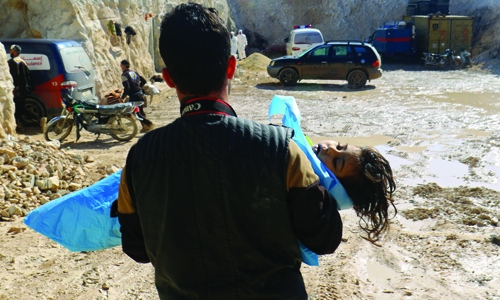Syrians feel hopeless as world watches barrage
Hiding underground in the concrete confines of her building’s basement, with her small son and 44 other women and children, Noor feels at every moment the meaninglessness of the words “cease-fire” or “truce” in Syria.
Above ground, the slaughter continues, with Syrian regime forces and Russian planes targeting Noor’s town of Douma, in eastern Ghouta, in their bid to crush the last remaining rebel enclave near Damascus. The onslaught has inflicted some 560 casualties in 10 days, in one of the most deadly episodes of Syria’s seven-year war.
“This has been the worst phase. I feel so stressed out … like the end is near,” says Noor, speaking on a mobile phone, its battery fading because she is unable to safely recharge outside with solar power.
“People worry they will die in a chemical attack, because there was one in [the area of] Shayfuniya,” says Noor, whose toddler Hamza is agitated over the lack of food and fresh air, like the other children who can be heard crying in the background. They are even running out of the rainwater they’ve collected to drink.
“I try to stay calm, but I’ve never felt this level of fear,” says Noor, whose eastern Ghouta district, just 12 miles from the center of Damascus, has been controlled by anti-regime rebels since 2012, and besieged by the government since 2013.
“We know that going back means death. It will be a massacre. We will all be buried,” adds Noor. “Let’s be clear: The regime is bombing civilians in their homes, not the fighters on the front. There is no way towards reconciliation or peace.”
The horror of her assessment seems widely, if not universally, shared. Of all those interviewed for this story – civilians, officials, and analysts – no one offered a practical solution to the crisis. One person wondered whether civilians could be evacuated to Idlib province in the north, though some observers have said that region could be the next to face President Bashar al-Assad’s triumphant wrath. Another suggested that all parties on all sides just be disarmed, and that a no-fly zone be imposed, a notion that seems less possible with every passing hour.
The global outcry has been emphatic, with UN Secretary-General António Guterres declaring Monday: “Eastern Ghouta cannot wait. It’s high time to stop this hell on Earth.”
LITTLE IMPACT FROM CEASE-FIRE
But so far the verbal furore has made little apparent difference to Mr. Assad’s playbook, which is using a relentless bombing campaign to capture the last remaining stronghold of what it considers “terrorists” near the capital.
A UN Security Council resolution demanding a 30-day cease-fire, adopted unanimously over the weekend, has not eased the air strikes or barrel bombs, and was met with reports of another chlorine gas attack.
And the order by Russian President Vladimir Putin of a daily 5-hour truce starting Tuesday, ostensibly to create humanitarian corridors and allow some of the 400,000 residents to flee, is seen by many in eastern Ghouta as just another mind game to help gain victory for the regime.
All told, from Feb. 19 through Feb. 27, some 560 people have been killed in eastern Ghouta, 107 of them children and 76 of them women, with more than 2,000 wounded, according to figures provided to the Monitor by the Civil Defense Unit officials known as “White Helmets.”
The Civil Defence Unit says dozens of people have been killed by air and missile strikes since the start of the daily truces, while Syrian state media, in their turn, Wednesday accused “terrorists” of targeting the safe corridor for the exit of civilians “for the second day in a row.”
For Syrian civilians like Noor, the agony has been years in the making: victimized first by forces loyal to Assad and their Russian and Iranian allies, and second by the host of rebel forces fighting them – in Ghouta most of them Islamists, and some linked to Al Qaeda. The result today, as the death toll rises, is a sense of hopeless abandonment.
Any hope or expectation that Europe or the US might intervene to stop the carnage, or even to give Assad and his allies reason to pause, disappeared from Syria’s front lines years ago, analysts say.
“Eastern Ghouta has resisted the siege, the bombing, all [that has] happened around it the past three years – it is literally the last area standing without some international support,” says Maha Yahya, director of the Carnegie Middle East Center in Beirut.
PRICE OF RESISTANCE
“The area needs to be taught a lesson, as far as the regime is concerned, so you bomb its people into submission, and you show the price of standing up to the regime – so there’s a big message there,” Ms. Yahya says.
That stark calculation appears to have been made public by Syrian government commanders themselves.
“I promise, I will teach them a lesson, in combat and in fire,” Brig. Gen. Suheil al-Hassan, head of the Tiger Force, said in a video posted to pro-government social media accounts last week and cited by the New York Times. “You won’t find a rescuer.” (Christian science monitor)
Related Posts

